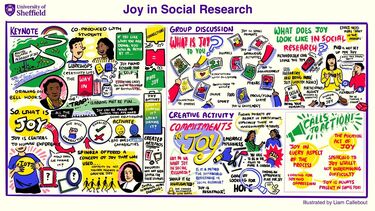Written by Bev Enion | Joy in Social Research Event, Monday 12 April 2025, The Wave, Sheffield
Following on from activities of the iHuman PGR disability studies reading group, this PGR-led event responded to, and mindfully created space for the need to explore and elaborate on the potential of joy in social research. By large, research and dialogue often works to deconstruct, debate and ultimately, offer solutions to complex social problems and inequalities. For example, by focusing solely on the ‘vulnerability’ of people when discussing social problems, overarching narratives of joyless lives are created. Yet, we recognise and argue that through the same pieces of empirical research, we can obtain a deeper insight and richer epistemological awareness into the joyful aspects of being a member of a marginalised community (Shuster and Westbrook, 2024). This is often the forgotten and overlooked aspect of academic dialogue, and of disability studies more specifically (Sunderland et al, 2009).
Using the space in this event, we were able to draw attention to the concept of joy. This allowed us to position it as a valuable area of consideration and something that we argue we can find present in a large proportion of social research projects, especially when we take the time to search for it and sit with it. With this in mind, this event aimed to create a receptive space in which PGRs and ECRs were encouraged to think beyond the social problem within their research. Instead, we challenged them to seek out affirmative, joyful understandings, however and wherever they may present themselves in the research process. In doing so, not only did we mindfully encourage those in attendance to view their research and data through a different lens, but as a united community of researchers contributing toward novel conversations in the field of social science.
Due to the originality of considering and conceptualising joy within social research, we were keen to ensure that this event informed and contributed to the small but budding conversations in the social sciences. Given this specific aim, it allowed us to be more focused in thinking about ensuring the event’s content, dialogue, discussions, and debates reached as many people as possible, including those within and beyond the Academy. Given that all members of the event’s organisation team are Disability Studies scholars, accessibility to this information was even more pertinent. To help promote the event accessibility, the Participatory Research Network at Sheffield University agreed to fund an event illustrator, Liam Callebout.
We believe that by having Liam present to produce an artistic visualisation of the event in a novel and engaging way, it has allowed us to provide information in an alternative, highly accessible format. The ability to easily disseminate Liam’s artwork also allows us to promote the applicability of the concept of Joy in social science research (image above). Not only that, but artistic dissemination of this nature offers new ways of knowing and understanding (Bruce et al., 2013), something that we argue is vital in a flourishing dialogue such a joy.
The hybrid event ran for half a day in The Wave building, the home of social sciences at the University of Sheffield, and comprised of four distinctive yet equally intertwined sections. Firstly, the event began with an in-person social networking space in which we encouraged a relaxed, informal atmosphere where attendees could get to know each other over lunch. This allowed for a sense of openness and supported participants' willingness to share when called upon during the session.
The informal networking was followed by an engaging and illuminative hybrid keynote presentation from Dr Will Mason and Dr Lauren White of the University of Sheffield. During this keynote, Dr Mason and Dr White presented their reflections from the Faculty of Social Sciences Education Funded Project, . They presented an empirical case for taking joy (and enjoyment) seriously to create more inclusive, meaningful, and connected educational environments. Drawing upon a co-produced research project with students, they shared experiences of education with joy as an organising concept. Students shared their meanings and interpretations of joy and the reality of its existence within higher education. From this, students revealed what conditions might be necessary for joy and enjoyment to exist, and the importance of this within their educational journeys. Dr Mason and Dr White drew upon literature and evidence from philosophy, education, psychology, and sociology and recognised joy and enjoyment as personal and political for all of us within the university. They both advocate for moving towards joyful learning to realise more inclusive and generative learning environments for everyone.
Following on, we provided attendees with a pile of stock images and tasked them with selecting either one or a small handful of images that resonated with their subjective interpretation of what joy means to them. Conversation was bountiful, and it soon emerged that joy was to be discovered and felt in a range of activities, ranging from the more mundane life tasks to special life events and family memories. Once more aware of how they conceptualise joy in their own lives, we then tasked attendees to think about how and where joy could be found in their social research projects.
The final section of the event embedded an arts-based, co-produced approach in which we challenged attendees to create commitments to joy and compile a call to action. Stemming from all the pockets of conversations in the event, it was decided that as PGRs and ECRs we should:
- Acknowledge that joy can exist in every aspect of the research process
- Think of joy as a political act
- Speak to joy whilst not undermining challenges
- Look for joy and oppression
- Acknowledge that joy is always present in some form
This call to action captures our commitments to joyful research whilst also recognising how joy sits amongst a range of emotions that are all essential to carrying out thoughtful scholarship. This is something we hope to revisit in the future and build on throughout our research.


